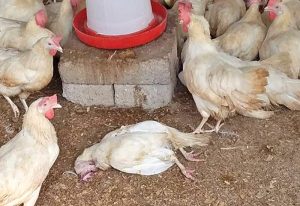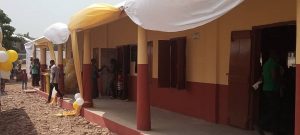We, the ones who are challenged, need to be heard; to be seen not as a disability, but as a person who has and will continue to bloom; to be seen not only as a handicap but as a well intact human being, Robert Michael Hansel has stated.
This quote from the disabled Guinness World Records holder for the longest non-stop wheelie in a wheelchair covering a total distance of 6.178 miles summarises the life and aspirations of Miss Nafisatu Mardi, a physically disabled seamstress at Tema.
Miss Mardi who was born without any disability, is aged 41 and relies on the use of two callipers and two crutches to enable her to move about and fend for herself.
She told the media in an interview in Tema to commemorate the International Women Day that disability indeed is not inability as she is a living testimony.
Life Story
With a smile on her beautiful face, she narrated the story as told her by her late mother on how she turned from an able person to a disabled one.
At age three, young Mardi, living with her grandmother at Nkawkaw in the Eastern Region fell sick with a high temperature, leading to her admission for a week at the local Government Hospital.
A few days after discharge, the family realised with distress that the sickness has rendered her paralyzed as she could not sit or stand on her own.
Several visits to the hospital to ascertain the cause, diagnoses, and possible intervention proved futile as the medics were unable to put their finger on anything.
The eighth born of nine children eventually started sitting unaided thanks to some treatment she received from Aponche Clinic in Tema. Her parents’ quest to see their daughter mobile once again pushed them to send her to the Orthopaedic Training Centre (OTC) at Nsawam upon recommendation from a neighbour.
Miss Mardi after going through surgery was finally introduced to the wearing of callipers on both legs and the use of crutches. This delayed her enrolment for formal education as it took her a long time to master its usage.
Getting Education
At age six, and having relocated to Tema, the physically challenged Nafisa started formal education at the Tema Community Five Number One Basic School. She described the experience as “not easy going to school at that time with the clippers and clutches even though the school was accessible.”
She moved between two schools from class three to Junior High School, as her family relocated from Community Five to Community Two, and finally sat for the Basic Education Certificate Examination (BECE) in 1998.
Apprenticeship and Work
The lack of accessibility at her choice secondary school led to her being put into an apprenticeship to learn the skills of dressmaking for three years.
After successfully passing out of the training, Miss Mardi set up a fashion home at Tema Community Two BBC. She has specialised in sewing for men, women, and children.
To her, there is dignity in hard work, and doing something with her hands emphasises the saying that ‘disability is not inability’.
She proudly indicated that she has been financially independent for the past 15 years as a seamstress and has also trained others to acquire the skill.
To her fellow colleagues living with disabilities, she encouraged them to stop begging for alms, noting that the act served as an embarrassment to the entire disabled community and fuels the public perception that disables are weak and a burden on society.
“It’s so embarrassing to see my colleagues begging, such acts make people think that we can only survive on alms, sometimes when approaching people for directions, they think you are coming to beg for money,” she said.
She extended a plea to the Government and employers to offer a level playing ground for persons with disability.
According to her, many of them have tertiary qualifications but had nothing to fall on economically but are discriminated against due to their disabilities.
This, she said, also contributed to the high number of disabled beggars on the streets of Ghana.
At age 41, she is yet to find love or give birth. She says many men always want to take advantage of disabled women as most of them only want secret sexual pleasure from them instead of commitment as they are ashamed of introducing them to friends and relatives.
She advised women with disability to focus and be vigilant not to fall into the hands of men who would not recognize their efforts and push them to great heights.
Accessibility
Being in a wheelchair, walking with crutches or with the aid of a white cane in Ghana, is not a comfortable and easy thing to do.

Miss Mardi expressed concern that most buildings and places in Ghana are not accessible to people with disabilities, emphasising that most event organizers do not also take into consideration the disability community when organising programmes.
“Accessibility must cover everything, due to the lack of public places of convenience at most public places for instance when I go out from home, I have to keep my urine till I return, the water closets in town are too low for someone like me in callipers to comfortably sit on, it is extremely difficult,” she said.
International Women’s Day
To Miss Mardi, the focus of International Women’s Day should not only focus on the achievements of women in high places but also on vulnerable women like herself who have gone through a lot but still smiling at the storms of life and creating abilities from their disabilities.
According to her, the lack of motivation and recognition for disabled women in Ghana has left most of them to wallow in self-pity.
For her, projecting them into the limelight will serve as a motivation for parents to invest in their disabled girl child who is already disadvantaged and vulnerable for being a female and disabled at the same time.
Men, she indicated, must be allied to the development of women, especially those with disability by supporting their families with the needed help, as according to her without such a help, she would have ended up begging like others.
She lauded men like Mr Yaw Kyei, President of the Association of Customs House Agents, Ghana who is her godfather, saying that they must be celebrated for contributing to the efforts to bring out the abilities in disabled women by providing the financial, physical, psychological, and other forms support.
She believes in technology as a tool for advancing the cause of of Persons Living with Disability.
Women with disability can only be digitally innovative when there are support structures for them, indeed pushing them up the stairs will not only empower them but also contribute meaningfully to the socio-economic development of their families, immediate surroundings, and Ghana as a whole.
“Lets us all #EmbraceEquity and make a reality the theme for the 2023 International Women’s Day celebration; “DigitALL: Innovation and Technology for Gender Equality,” for we all need to be digitally and technologically inclined and built up and sustain an all inclusive and prosperous society.
Ashantibiz




